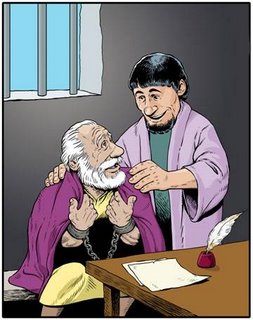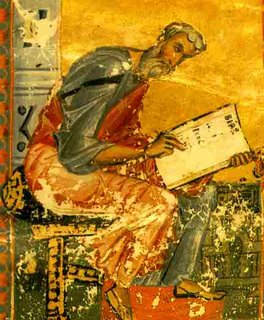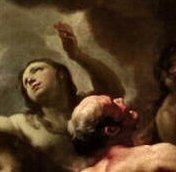 Due to some work I’ve had to do and some health issues (I recently had an appendectomy and a hernia repaired), I haven’t had much time to blog. Eventually, I will be a bit more faithful in posting some thoughts that I hope you’ll find interesting, but for now, I break my silence in memory of “Pebbles”, our pet of the past 13 years who passed away last Sunday. Yes, for a guy to be writing this, I feel a bit corny, but what can I say-- I loved the ol' girl!
Due to some work I’ve had to do and some health issues (I recently had an appendectomy and a hernia repaired), I haven’t had much time to blog. Eventually, I will be a bit more faithful in posting some thoughts that I hope you’ll find interesting, but for now, I break my silence in memory of “Pebbles”, our pet of the past 13 years who passed away last Sunday. Yes, for a guy to be writing this, I feel a bit corny, but what can I say-- I loved the ol' girl!Needless to say, my kids are devastated as am I. She was a wonderful little munchkin, a bit temperamental at times (I think it was the Pekingese blood), but even on her off days she was a pleasure. We saw the writing on the wall the past few months. She was nearly blind due to glaucoma, was getting a bit slower due to arthritis, had quite a few accidents due to circumstances beyond her control, and eventually couldn’t make it up the smallest flight of stairs. Due to the accidents, I was forced to keep her in the basement at nights, but she would always scratch on the door in the morning, reminding us to let her out. Eventually, the scratches ceased because she couldn’t get up the stairs to the door and we would carry her up and down as she got worse. As time progressed, it became evident that her hind legs were becoming non-functional and she couldn’t take three steps before sitting down. Eventually, it got to the point where she couldn’t use them at all. Yes, the writing was on the wall. It was heartbreaking to see the condition she was in and our denial could only go so far. It culminated last Friday, when we went down to the basement to get her, but found her lying in her urine. This was the first time she couldn’t move enough to urinate. It was then that we realized it was time.
The following Sunday was surreal. I couldn't believe what we were about to do. My daughters accompanied me to the vet, hoping that it was a matter of a shot or two for "Pebs" to be as good as new, but the vet brought us back to reality, stating the obvious, compassionately explaining to us the process of euthanasia. He told us that Pebbles was the equivalent of a 105 year old (doggy years), a dog that has lived way beyond the life expectancy of her breed. To prolong it would mean that she'd only get worse. It would be a pretty selfish thing to put her through any more suffering. We knew it would be best to put her down, but we loved her and wanted her to stay. Yes, the vet was right, there was a whole lot of selfishness involved, but reality bites and we knew what we had to do. Needless to say, my daughters were in tears, but wanted to be present, out of love and support, to see her through her final moments.

(Bethany & Pebbles circa 1996)
The process was very humane—a sodium pentothal injection that would put her to sleep instantaneously. After explaining the process a bit further, they shaved a spot on her leg to locate a vein, gave her the injection and, no sooner then that, our beloved Pebbles was gone. I knew it would be a bit traumatic, and my daughters were sobbing frantically, but they wanted to be there. All I could do was comfort them. My mind wandered back to a time when my kids were “kids”, Pebs was just another one of the kids, and it really saddened me. Pebbles’ death reminded me that my kids really aren't kids anymore. My son, the oldest, is 21 and my daughters are 19, 17, and 15 years of age. I realized that, at that moment, Pebs wasn’t only our pet, but a doorway to a time that has long passed us. A simpler time when life involved running in the park, summers at the pool, Teenage Mutant Ninja Turtles, My Little Pony and Barbie dolls, collecting Beanie Babies (Bongo the Monkey, where are you!!), training wheels on bicycles, Skittles, Reese's Peanut Butter Cups, and bubblegum flavored ice cream. Wayne Watson's "Watercolour Ponies" was playing in my mind as I looked at Pebbles' body, at my daughter and their tears, but all I could do is caress my babies and cry with them.
When we got home, we all reminisced amongst yet more tears. When she came to live with us, she was about 2 years old, the victim of a “no pets” policy, her former owners moving to a new apartment. Sure, she wasn't the prettiest dog around, the product of an amorous Pekingese and a Pug (at least we think), but man was she a cutie! At least to us she was. “Pebs” fell in love with my daughter Bethany, who was about 6 years old at the time, and the two were instantly inseparable. They were chums, pals in the strictest sense of the word, and it became rare to see one without the other. On those occasions when Pebs got locked out of Bethany’s room, she would scratch on the door until someone let her in. It wasn’t long before Beth would be woken up by a cold nose and a wet tongue. And, if that didn’t work, Pebs would literally sit on her chest until she woke up. Pebbles was very protective and would get defensive if anyone she didn't know got near our kids. I was sure that she would stare danger in the eye and give everything she had to protect our children. She was a brave little thing and would stand up to any dog or anyone, even those who were six times (or more) her weight and size. She was fearless! She was a “jelly dog”, a nickname we gave her because she would get very jealous when there was a hug involved that didn’t include her. It was funny to see my girls hug each other purposely to see the way she would react. She would jump on them, claw away, and wriggle her way into the hug. She was just one of the girls. She was quirky. Other dogs will sit near the dinner table and stare at you pitifully until you gave them a morsel, but Pebs grabbed the bull by the horns—she would put her paws on your lap and bark you into submission. You'd find yourself practically giving your dinner away. Once you gave her the first taste, she'd munch it down and then repeat the process. Sure, it was a little annoying, but an annoyance I would gladly put up with if we could only have her back. When we'd run errands, we'd sometimes take her along for the ride. When we'd return, we'd tap on the car window and she'd attack the glass, barking ferociously at our hands tapping on the windows. She couldn’t stand it, but the faces she would make were hilarious. Pebbles was also very sociable and you would always find her in the room with the most people. She wasn’t embarrassed to get dressed up and didn’t mind the cowboy hat or a Santa Claus costume the girls would put on her. She was never particular about style. She had good instincts and we could let her outside knowing full well that she would always be back. She always knew which house was her home…but now…she’s gone…and it's sad to know she won’t be home anymore.
It’s been only three days since she passed away and “man!” do we miss her. The house seems a bit emptier and we still expect to see her around the corner, sleeping on her favorite patch of carpet, under the computer desk, or in Bethany’s room. We still expect the “jelly dog” to wriggle her way into our hugs. Our dinnertimes? Well, now they're silent. Old habits are hard to break and my son found himself saving some leftovers for her. He forgot she was gone. It’s amazing how these little guys just come into your lives, take over, get you loving them and treating them like royalty and, before you know it, they're gone. Yes, I expect that we will eventually go out and get another little guy. Who knows! It may be a Yorkshire or maybe a Corgi—but for now, we grieve and reminisce about our little Pebbles, who will always remain a part of our lives.
Dearest Lord Jesus, thank you for enriching our lives by providing this wonderful little dog. We will miss her and pray for Your comfort as we grieve, but she will always live in our memories and in our hearts. Again, we thank You and praise You for remembering our family and blessing us with the ability to care for one of Your creatures. Amen.











































